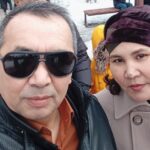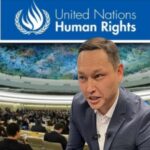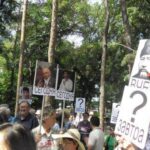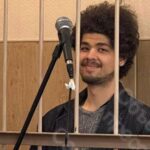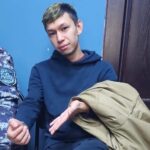The following summary is based on Kazakhstan International Bureau for Human Rights and Rule of Law (KIBHR) monitoring findings[1]. For the second quarter of 2013 (April-June) KIBHR monitors recorded 46 assemblies.[2]
City /Oblast | Number of assemblies |
Almaty | 16 |
Astana | 9 |
4 | |
4 | |
Shymkent | 2 |
Aktau | 2 |
Stepnogorsk | 1 |
Zhanaozen | 1 |
Zhezkazgan | 1 |
Almaty oblast | 2 |
1 | |
2 | |
1 | |
TOTAL | 46 |
All assemblies were peaceful. Only one assembly, of ethnic Kazakh returnees (Oralmans; ethnic Kazakhs from other countries who have immigrated to
The total number of participants in all assemblies was more than 6100. The typical number of participants in each assembly ranged from 30 to 60. The largest in terms of participants number was the assembly in Zhalpaktal settlement (
Only 4 out of the 46 assemblies were given permission by the local authorities (akimat). There rests of assemblies were conducted without permissions.
Policemen continue to practice an individual approach with regard to imposing sanctions and penalties after an assembly, apparently depending on the subject of each individual assembly and its organizers/participants, rather than standard legal requirements. As a rule, they do not persecute organizers/participants of assemblies held without permission when the subject of the assembly does not address internal social or political problems or when organizers/participants are from pro-governmental parties or movements. For example, participants of the non-permitted assembly in Astana who demanded an impartial and fair trial in thecriminal investigation initiated against a Kazakh student connected to the
Law enforcement bodies demonstrate a completely different approach toward civic activists with critical views, in particular to those who raise pressing social problems. As a rule, all assemblies organized by critical activists were restricted either prior to the assembly or during it with sanctions and penalties imposed on organizers and/or participants.
For example, on May
The morning of June
The reaction of law-enforcement bodies to the assemblies not permitted by akimat varies from region to region. For example, in
The trend of change in the subject matter of assemblies continues in
The trend of decrease in assemblies organized by opposition political parties also continues. During the second quarter of 2013 there was only one assembly held by former activists of Alga! party against the deportation of MukhtarAblyazov’s wife and daughter from
In Almaty there also appeared a new social movement (without registration) Birge (Together), the participants of which are active in organizing and conducting assemblies on social and economic problems.
[1] KIBHR is FH’s grantee under Freedom House’s USAID-funded project “
[2]Monitoring of assembly is through personal observation as well as through media and social networks.
[3]People assembled due to electricity being shut off, and went to Oskemen from “Shigys” settlement. During the protest the participants attacked policemen and journalists, threw stones, and tried to overturn cars.
[4]On June



